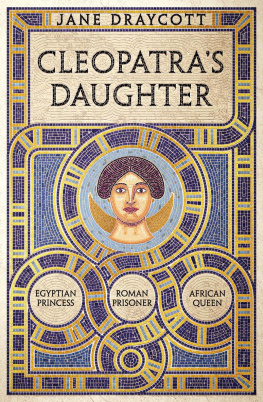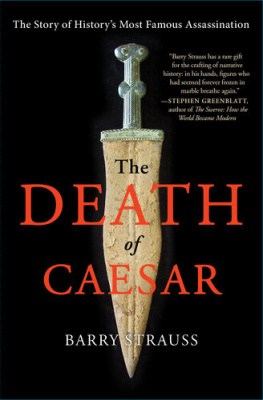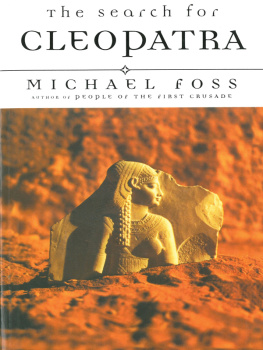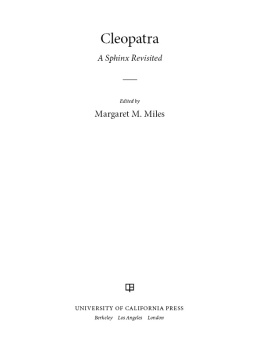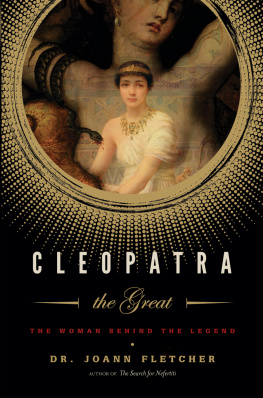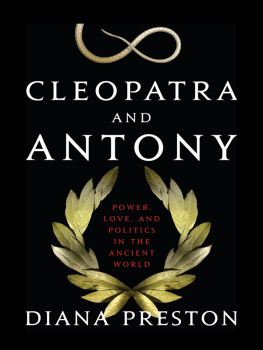

Published in 2018 by Britannica Educational Publishing (a trademark of Encyclopdia Britannica, Inc.) in association with The Rosen Publishing Group, Inc.
29 East 21st Street, New York, NY 10010
Copyright 2018 The Rosen Publishing Group, Inc. and Encyclopdia Britannica, Inc. Encyclopdia Britannica, Britannica, and the Thistle logo are registered trademarks of Encyclopdia Britannica, Inc. All rights reserved.
Distributed exclusively by Rosen Publishing.
To see additional Britannica Educational Publishing titles, go to rosenpublishing.com.
First Edition
Britannica Educational Publishing
J.E. Luebering: Executive Director, Core Editorial
Andrea R. Field: Managing Editor, Comptons by Britannica
Rosen Publishing
Heather Moore Niver: Editor
Nelson S: Art Director
Michael Moy: Designer
Cindy Reiman: Photography Manager
Heather Moore Niver: Photo Researcher
Library of Congress Cataloging-in-Publication Data
Names: Uhl, Xina M., author.
Title: Cleopatra : Queen of Egypt / Xina M. Uhl.
Description: First edition. | New York : Britannica Educational Publishing in association with Rosen Educational Services, 2018. | Series: Women who changed history | Includes bibliographical references and index.
Identifiers: LCCN 2016057941| ISBN 9781680486407 (eBook)
Subjects: LCSH: Cleopatra, Queen of Egypt, -30 B.C.Juvenile literature. | QueensEgyptBiographyJuvenile literature. | EgyptKings and rulersBiographyJuvenile literature. | EgyptHistory332-30 B.C.Juvenile literature.
Classification: LCC DT92.7 .U33 2018 | DDC 932.021092 [B] dc23 LC record available at https://lccn.loc.gov/2016057941
Manufactured in the United States of America
Photo credits: Cover, p. 40 DEA/A. Dagli Orti/De Agostini/Getty Images; p. 7 Alessandro Vannini/Corbis Historical/Getty Images; p. 9 iStockphoto.com/ZU_09; pp. 1011 Encyclopdia Britannica, Inc.; p. 13 DEA Picture Library/De Agostini/Getty Images; p. 15 National Geographic Creative/Alamy Stock Photo; pp. 17, 28 Hulton Archive/Getty Images); pp. 1819, 25 Bettmann/Getty Images; p. 21 Mary Evans Picture Library/Alamy Stock Photo; p. 22 pseudolongino/Shutterstock.com; p. 23 John Springer Collection/Corbis Historical/Getty Images; p. 30 Print Collector/Hulton Archive/Getty Images; p. 31 DEA/L. Romano/De Agostini/Getty Images; pp. 3233, 36 Heritage Images/Hulton Fine Art Collection/Getty Images; pp. 3839 V&A Images/Alamy Stock Photo; p. 41 Peter Horree/Alamy Stock Photo; p. 42 Movie Poster Image Art/Moviepix/Getty Images; p. 43 Cornell Capa/The LIFE Picture Collection/Getty Images.
Contents
CHAPTER ONE
DAUGHTER OF THE NILE
CHAPTER TWO
A YOUNG QUEEN
CHAPTER THREE
DANGER AND DESIRE
CHAPTER FOUR
ROME TRIUMPHS
C leopatra is one of the most famous women from ancient history, and for good reason. As the queen of Egypt, she ruled the richest nation that bordered the Mediterranean Sea. But she lost that throne at age twenty-one when she was driven into exile by her brothers supporters and forced to flee Egypt for Syria. She only regained the throne through an alliance to a powerful Roman named Julius Caesar. Once she was restored to her throne, however, the drama did not end. It continued with the murder of one and possibly two of her brothers, clever plotting by Cleopatra to increase Egypts fortunes, and armed conflict that ended in her death.
At a time when Egypts rulers distanced themselves from their subjects, Cleopatra did not. She was the only member of her family to learn the Egyptian language. In her portraits, she appeared wearing Egyptian dress. One of her titles was Philopatris , a word that means she who loves her country. This love was returned by the Egyptian people, among whom she was greatly popular.
As a woman ruler she made full use of all her gifts as a person and a descendant of her royal family. Plutarch, a biographer from antiquity, described her as charming, irresistible, and bewitching. She was not a great beauty, he said, but her presence alone impressed everyone. When she spoke, It was a pleasure merely to hear the sound of her voice, with which, like an instrument of many strings, she could pass from one language to another. In fact, Cleopatra spoke nine languages in all.
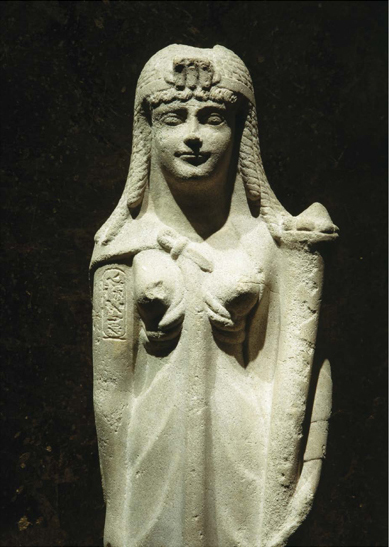
Though many people today remember Cleopatra for her beauty and charm, she was also a powerful ruler who did not hesitate to order the deaths of her enemies.
Cleopatra was not only smart and daring, but ruthless and murderous. Like other rulers in the ancient world, she sent countless soldiers to die in her wars. She sacrificed some of her own family to her ambitions as well.
During Cleopatras lifetime (6930 BCE), Egypt was more than a fabulously wealthy country. It was also the last of the nations of the Mediterranean to keep its independence from the Roman Empire. Rome, the seat of the Roman Empire, lies in the middle of the Italian peninsula. From here streamed legions of soldiers. They conquered modern-day North Africa, Greece, the Balkans, Germany, France, Spain, and Britain. One of these conquerors, Julius Caesar, would play a large part in Cleopatras life. So would Caesars companion, a powerful Roman general named Mark Antony. Antony became Cleopatras husband and the father to three of her children.
She used all her power to keep Egypt free of Romes greedy grasp. In the end, her gamble failed. When Julius Caesar was murdered, civil war broke out. Soon after, Rome declared war on Egypt. Cleopatra and Mark Antony joined their navies to fight a legendary battle. They lost. Both ended up dying by suicide.
In the years since her death, the memory of Cleopatra has lived on. She has been a subject of poems, plays, books, art, and films. However, her fascinating true story rivals the fiction.

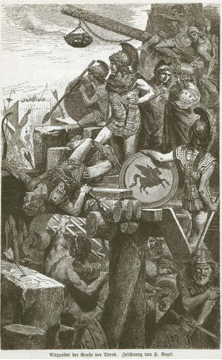
Alexander the Great ordered a causeway to connect the island of Tyre with the mainland and sent his armies over it to conquer the city. The causeway remains in place today.
I n the fourth century BCE a conqueror emerged from the rocky highlands of what is today Macedonia. Alexander the Great (b. 356 BCEd. 323 BCE) and his army of Greeks swept through the Mediterranean world. They conquered land east across Asia Minor, the Middle East, and all the way to India. To the south, they defeated and ruled Egypt. Alexander founded cities along the way. One of those was Alexandria, on the northern coast of Egypt. It sat at the mouth of the mighty Nile River.
Alexander died in 323 BCE without leaving a successor to his empire. His four generals divided up his empire and ruled it. Ptolemy was the name of the general who took over Egypt. He established a dynasty of the same name there. Egypt reached the height of its glory from 285 to 246 BCE. Afterward, a long age of war and fighting within the country caused it to decline.









